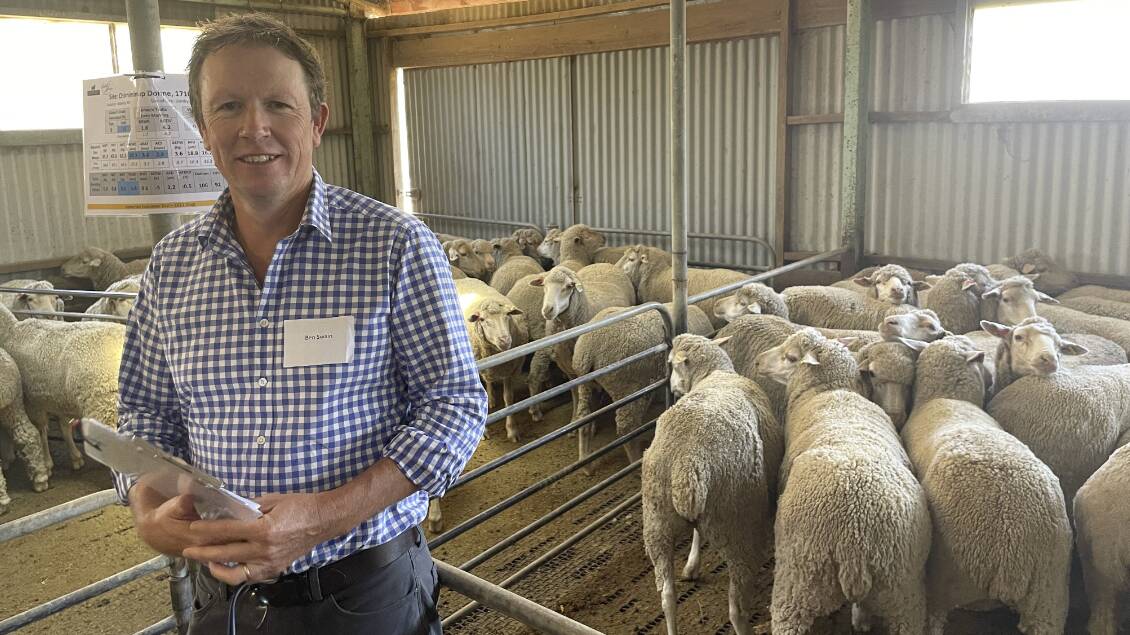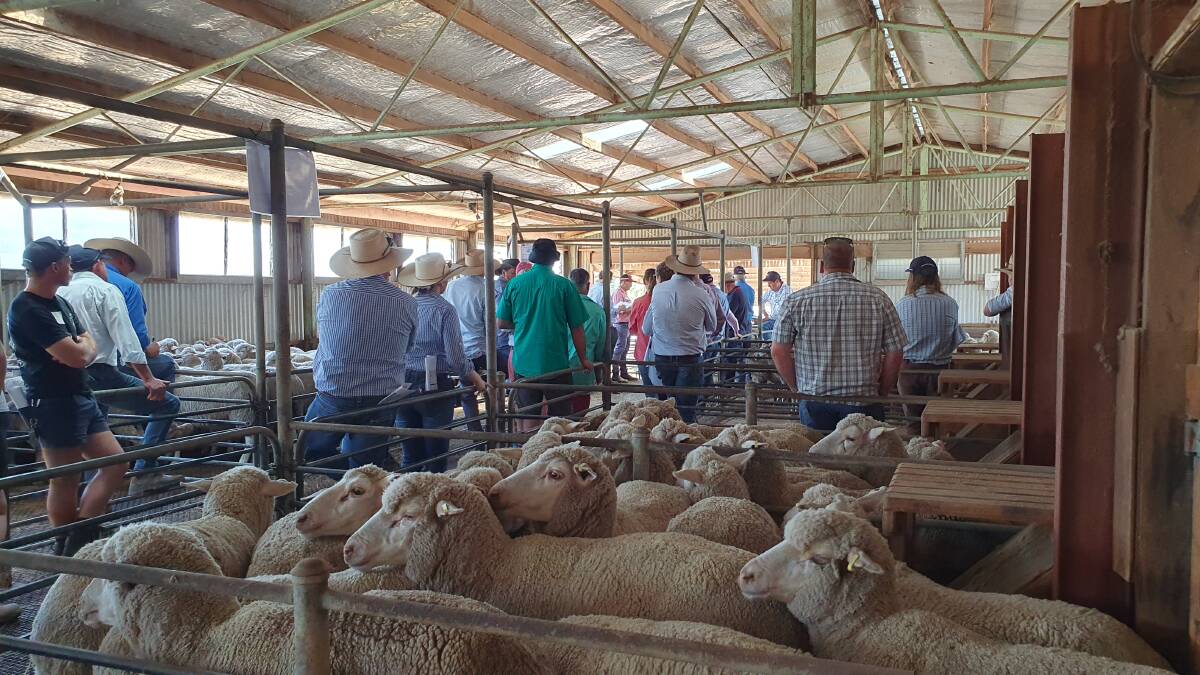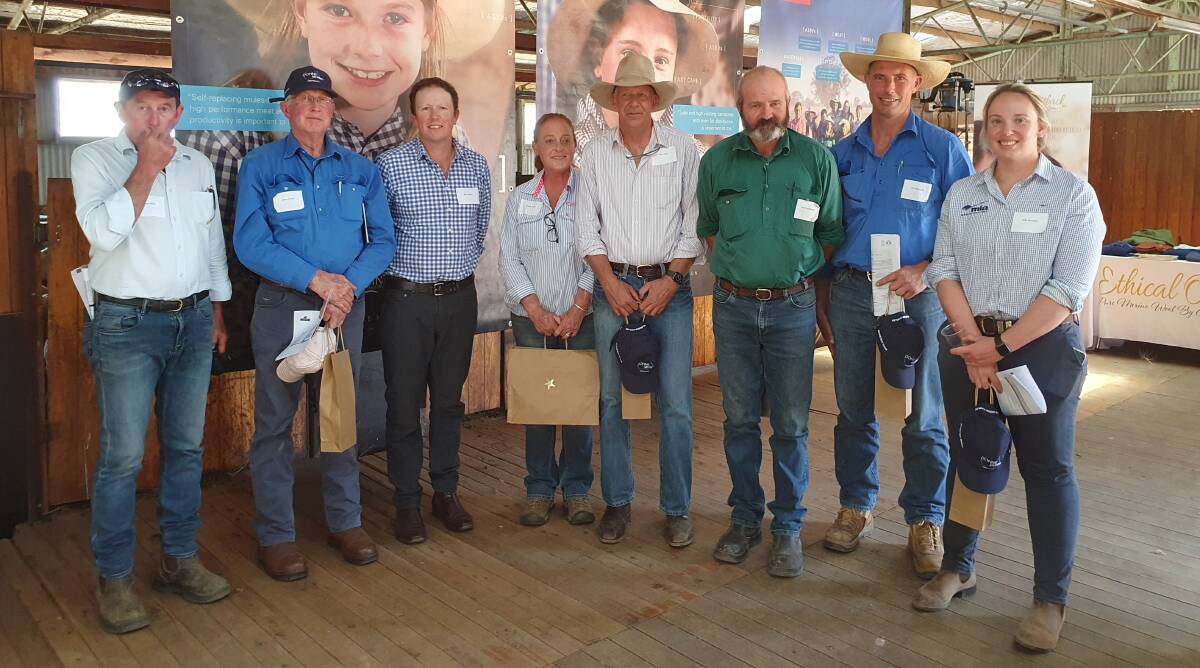Dohne trial leads the way for reproduction and meat eating quality results

This is branded content for Australian Dohne Breeders Association
An innovative Dohne sire evaluation trial is providing valuable insights on the reproduction and meat eating quality performance of the breed, with the latest results released at a field day in February.
Held by Dohne trial hosts, Tom and Sophie Holt, at their property, Coonong Station, Urana, NSW, an extensive range of ewe reproductive data, along with the results of the meat eating quality tests, were presented to interested field day participants.
Additional comprehensive wool, growth and visual trait assessments were also released.
Established by the Australian Dohne Breeders Association in 2021, the sire evaluation trial at Coonong comprises 13 Dohne rams entered from breeders in NSW, South Australia, Western Australia and Victoria.
Two Poll Merino sires that are linked across Merino Lifetime Productivity project sites are also being used.
According to Australian Merino Sire Evaluation Association chief executive officer Ben Swain, the results confirmed the dual-purpose breeding direction of the Dohne.
"The results show the reproduction, wool and carcase quality traits of the Dohne breed in a positive light, and are comparable to the two leading Merino link sires," Mr Swain said.
"But it also demonstrates that some rams do it better than others, there was significant genetic variation in the results which is important to achieve genetic gain in the breed."

With reproduction a key focus of the trial, the 2021-drop ewe progeny of the 14 rams were kept and joined to commercial Dohne sires from Coonong Station to lamb last year. The lambs have now been weaned and the ewes mated for a second time.
A range of information was collected to provide an evaluation of the ewes' reproductive performance using the weaning rate breeding value from Sheep Genetics, which is made up of three components - conception, litter size and ewe rearing ability.
"This is the first time this analysis, using the new weaning rate trait, has been carried out on data collected on Dohnes," Mr Swain said.
"It is very important as it demonstrates that these three traits make up the success of whether a ewe weans a lamb or not and those three traits can act quite independently.
"A ewe can get in lamb quite easily, and she can have multiple lambs on board but it is a completely different trait whether she rears them all or any of them."
According to Mr Swain, the early results highlight significant reproduction variation in the performance of the Dohne rams.
"There was a 24pc difference between the top-performing Dohne ram and the bottom performing Dohne ram in the number of lambs weaned, which is huge," he said.
"That genetic variation is what we look for in these trials.
"It was also pleasing to see that the top-performing Dohne ram within the reproduction traits consistently matched it with the two Merino link sires."

But Mr Swain said while the first year results were an indicator of the reproductive performance of the sire's genetics, he expected the results to change significantly in the second joining.
"Reproduction is only about five pc heritable in the daughters of the sire, while the other 95pc is environmental, it is a lowly heritable trait," he said.
"We also know that maiden ewes can have a very different reproduction performance when we join them in the second and subsequent years, from the first time they lamb versus the second time they lamb you get a lot of re-ranking in the sires.
"That's why it is important to collect at least two years of reproduction data because of the variability, I would expect there will be some changes in the results next year."
Mr Swain said the Dohne breed also performed well in the carcase and meat eating quality evaluations which were carried out on a portion of the 2021-drop wether lamb progeny processed last year at Gundagai Meat Processors in NSW.
"The combination of high intramuscular fat (IMF) and low shear force are the two traits which give a pleasant experience when eating lamb," Mr Swain said.
"In this trial the Dohnes performed very well for meat eating quality, with several of the sires achieving exceptional results, but there was significant variation which enables improvements to be made."
Mr Swain said research has shown that the traditional traits of carcase weight and lean meat yield are actually negatively correlated to meat eating quality, highlighting the importance of this work.
"We know if we push one trait too hard you'll get a negative result on another trait, so it's not surprising that some of the bigger, growthy sheep aren't that good for meat eating quality," he said.
"This meat eating quality work is all designed around getting meat eating quality back into lambs while still being able to get them growing at a profitable rate."

A highlight in the Coonong Dohne trial for Mr Swain that he said might surprise breeders was the wool quality results which were visually assessed.
"The daughters of many of the Dohne rams were very good for wool quality and this was an area where the breed was on par, if not better for some rams, than the two Merino link sires," he said.
"One of the Dohne sires' results would fit any fine wool Merino flock and I think a lot of producers wouldn't expect that.
"Again there was big variation in traits such as colour, fleece rot and staple structure but generally the Dohnes performed very well for wool quality, as they did for conformation traits as well as breech cover and breech wrinkle."
The Coonong site was also one of the first sire evaluation trials across all breeds to complete the recording of the new visual udder and teat traits of ewes at weaning.
"The udder and teat traits have only recently been released with the research data collected through the Australian Wool Innovation-funded Merino Lifetime Productivity project," Mr Swain said.
"The results don't show a lot yet because the ewes are maidens, we'd expect to see more variation next year."
Mr Swain said the Coonong Station trial was unique in the extensive range of information being collected.
"There are currently nine Merino sire evaluation trials underway across Australia and the Coonong Dohne trial site is the gold standard in terms of the volume of data being collected, particularly for those hard-to-measure traits," he said.
"There is no other trial that is currently assessing both reproductive performance and meat eating quality, the Dohne trial is really at the forefront of the sheep industry when it comes to measuring these traits."
The Coonong trial is also the only sire evaluation site in Australia using Dohne commercial ewes as the breeding base which gives breeders an opportunity to assess the performance of full Dohne progeny.
This is branded content for Australian Dohne Breeders Association


